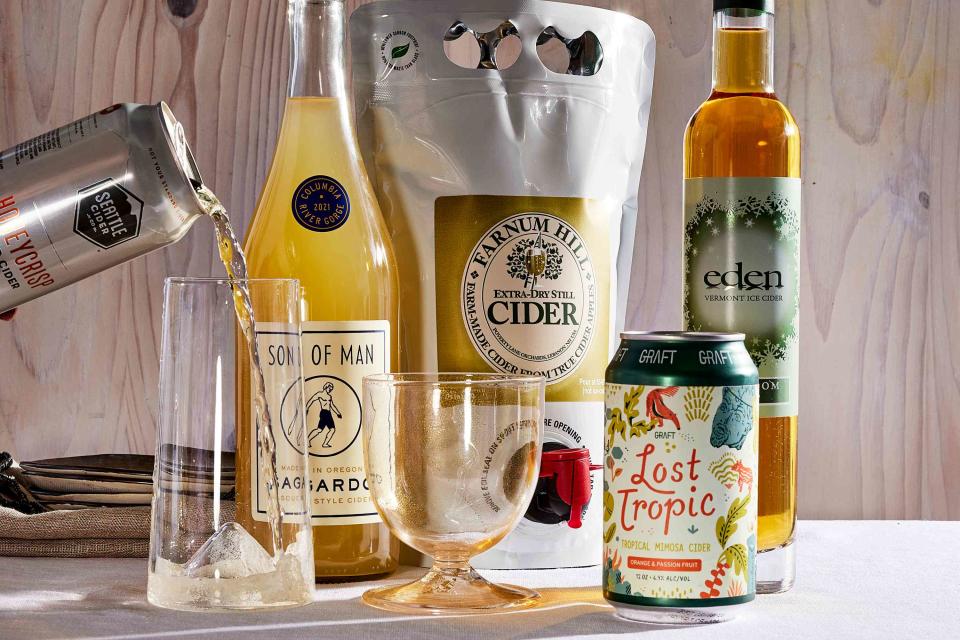Meet the New Wave of American Cider Makers
Regional cider makers across the country are reinventing the comforting fall classic.

As the director of innovation and quality for Denver's Stem Ciders, Patrick Combs prefers to think like a painter. And artists require the right medium. Every five days, the urban cidery sends a truck driver to southern Washington to retrieve freshly pressed culinary and dessert apples that will then be fermented with white wine yeast, creating what Combs calls a "blank canvas." He then fills his culinary palette with lemongrass, oolong tea, turmeric, and grapes, creating ciders evocative of rosé wine or a salted-cucumber snack. "One of our cofounders jokes that our official slogan should be, 'Wow, that's actually pretty good,'" Combs says, laughing.
Across America, regional cider makers are riffing on classic cocktails, blending apples with fruits, hops, and herbs, and reviving tannin-rich heirloom cultivars ideal for producing elegant ciders, not for eating, such as Thomas Jefferson's favored Virginia Crab. "Apple variety matters just as much in cider as grape variety matters in wine," says Michelle McGrath, the executive director of the American Cider Association.
An estimated 15,000 varieties of named apples once grew in North America, as hard cider was early America's favored alcohol—a hygienic alternative to water, which in the 1700s and 1800s was often a route to sickness. "Hard cider was as much a part of the dining table as meat or bread," Howard Means wrote in Johnny Appleseed, his biography of John Chapman, the pioneering nurseryman and, later, American legend. But agrarian cider's grip ebbed in the mid-19th century thanks to newly popular lagers brewed by German immigrants, and was further weakened when Prohibition forced cider to take a not-so-hard turn.
Today's resurgent ciders offer a broad spectrum of flavors, ingredients, and cider-making approaches. Come fall, spiced ciders evocative of pumpkin pie are a popular "comfort drink," says Kyle Sherrer, an owner of Backpack Brands, which produces both traditional ciders under the Hudson North name and experimental ones as Graft. Son of Man in Oregon makes spontaneously fermented, cuttingly acidic Basque-style cider, and Farnum Hill grows tannic, acidic, heirloom apples for its bone-dry expressions of New Hampshire terroir. "Cider is not as one note as people assume," McGrath says. He's right. And here are five ciders that might just be the apples of your eyes.
Five Great Artisan Ciders
The best way to find these ciders, unless you are local, is to buy them online directly from the producers.
Son of Man Sagardo
Inspired by Spain's brightly acidic Basque cider, Oregon's Son of Man spontaneously ferments its Sagardo, then ages it in oak foeders for a cutting cider with notes of papayas, bananas, and a bit of earthy funk.
Graft Lost Tropic
Graft's mimosa-inspired cider that gets its citrusy kick from tangerines and cold-pressed orange oil, while passion fruit provides a tropical pop.
Farnum Hill Ciders Extra Dry
At Poverty Lane Orchards in Lebanon, NH, Stephen Wood and Louisa Spencer grow some of the Northeast's finest heirloom cider apples, turning them into ciders like this razor-sharp gem. It cuts through rich food effortlessly.
Seattle Cider Company Honeycrisp
The sweet-tart Honeycrisp apple is the singular star of this Pacific Northwest cider, which comes off as a as a crisp and condensed expression of the popular cultivar.
Eden Specialty Ciders Heirloom Blend
To make this sweet, non-sparkling ice cider, Eden presses about 15 varieties of Vermont apples and freezes the juice, creating a concentrate that's fermented and then aged upward of three years. Drink it with, or as, dessert.
Stem Ciders Chile Guava
This off-dry blend of Pacific Northwest apples and guava purée is infused with guajillo and ancho chiles for a balanced interplay of sweet, fruit, and heat.
Virtue Cider Percheron
Michigan’s Virtue looks to France’s Normandy-style ciders to make the drily rustic Percheron, named for the French horses that worked farms and orchards. Wild Brettanomyces yeast and red wine barrels give it a nuanced tannic funk.
Blake’s Hard Cider Co. Grand Cherry
Founded in 2013 on a third-generation family farm in Michigan, Blake’s ferments this fall release with bourbon oak staves and blends in orange peel and Michigan-grown Montmorency cherries. It’s like an Old Fashioned in an orchard.

